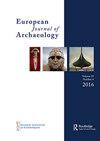Marks如何铺路(d):罗马萨加拉索斯(小亚细亚西南部)的石匠标记和石雕技术
IF 1.4
2区 历史学
0 ARCHAEOLOGY
引用次数: 0
摘要
从20世纪80年代到现在,对古代建筑中石匠标记的研究一直是一个系统的研究课题,它倾向于关注一些标准用途,并将其他看似随机的图案视为保护问题,这使得这些标记的考古潜力在很大程度上未被开发。本文提出了一种方法论方法来解释这些明显武断的模式,并在四个案例研究中对土耳其西南部萨加拉索斯的当地劳工组织进行了历时性分析:上阿戈拉、下阿戈拉,哈德良睡莲和马克隆。对石匠标记的空间分析以及对石刻技术和金石数据的检查表明,不同的标记要么是由同一个人产生的,要么是同一施工过程的一部分。本文章由计算机程序翻译,如有差异,请以英文原文为准。
How Marks Pave(d) the Way: Stonemasons’ Marks and Stone Carving Techniques in Roman Sagalassos (South-Western Asia Minor)
The study of stonemasons’ marks in ancient constructions, a subject that has been systematically investigated since the 1980s to the present, tends to focus on a few standard uses and consider other seemingly random patterns as issues of preservation, leaving the archaeological potential of such marks largely untapped. This article presents a methodological approach to explain these apparently arbitrary patterns and a diachronic analysis of local labour organization at Sagalassos in south-western Turkey in four case studies: the Upper Agora, Lower Agora, Hadrianic Nymphaeum, and Makellon. The spatial analysis of the stonemasons’ marks and examination of the stone carving techniques and epigraphic data suggest that the different marks were either produced by the same individuals and/or formed part of the same construction process.
求助全文
通过发布文献求助,成功后即可免费获取论文全文。
去求助
来源期刊

European Journal of Archaeology
ARCHAEOLOGY-
CiteScore
3.40
自引率
6.70%
发文量
58
期刊介绍:
The publication organ of the European Association of Archaeologists, the European Journal of Archaeology seeks to promote open debate amongst archaeologists committed to a new idea of Europe in which there is more communication across national frontiers and more interest in interpretation. The journal accepts not only new empirical data and new interpretations of the past but also encourages debate about the role archaeology plays in society, how it should be organized in a changing Europe, and the ethics of archaeological practice. All periods are covered; papers, review articles, interviews and short "debate" pieces are all sought. Whilst English is the primary language of publication in the EJA, papers submitted in French or German will be given equal consideration.
 求助内容:
求助内容: 应助结果提醒方式:
应助结果提醒方式:


